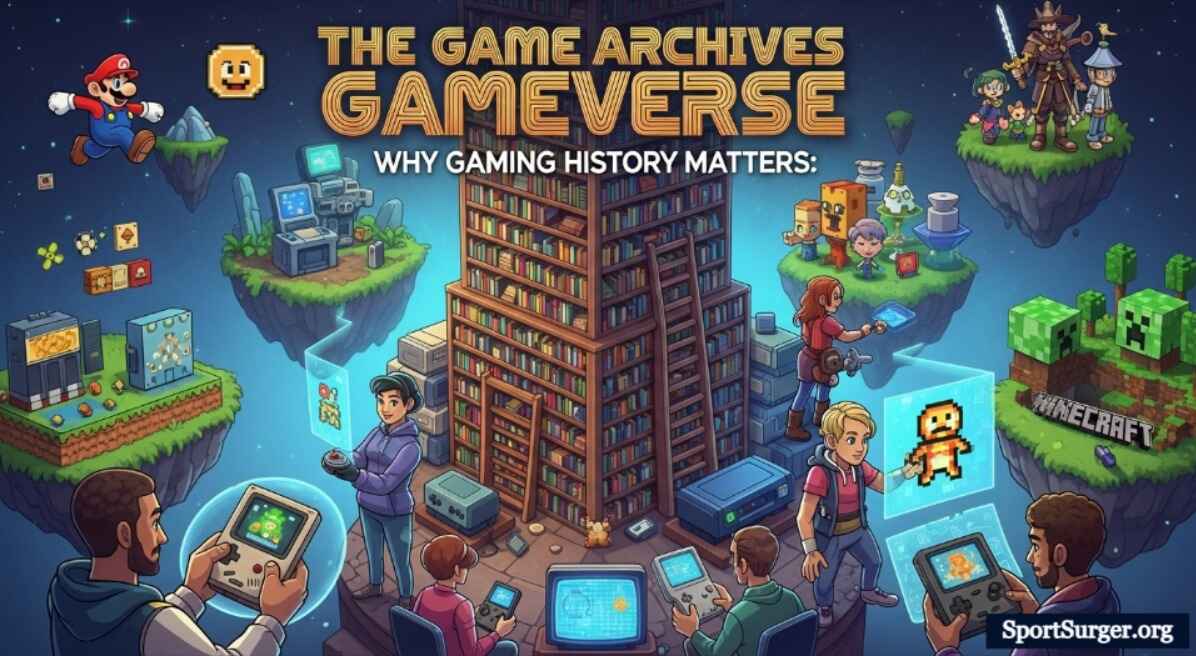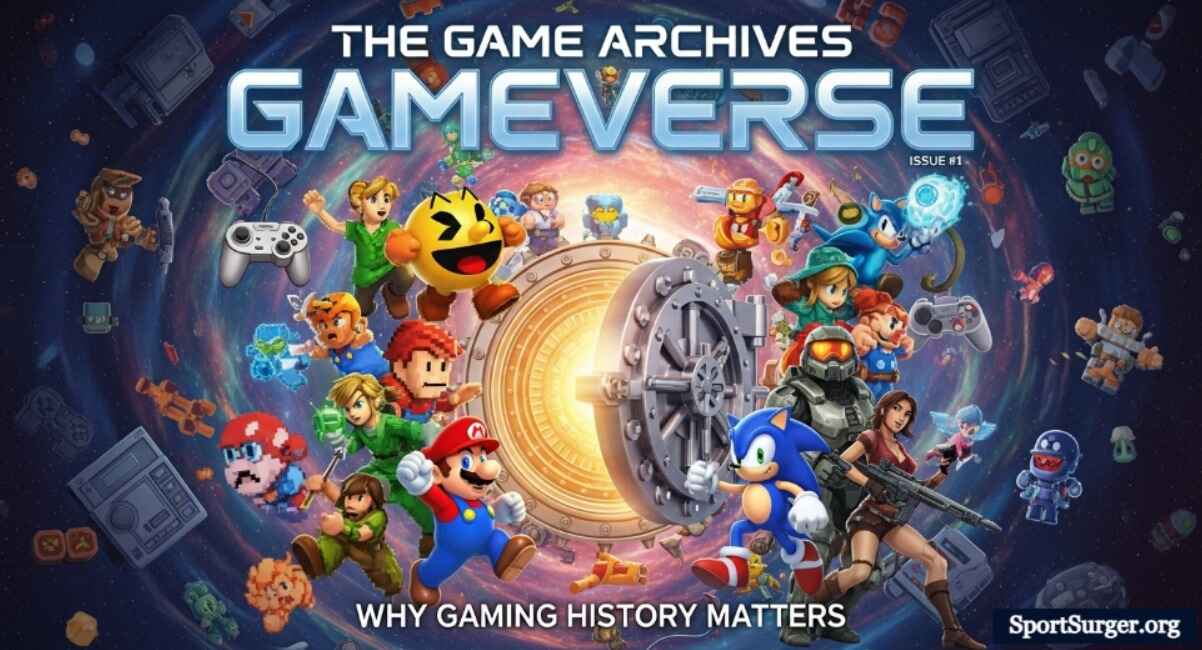Introduction
Video games are more than just entertainment—they are cultural artifacts that shape how generations connect, learn, and express creativity. The game archives gameverse has emerged as a digital treasure chest, preserving decades of interactive experiences, stories, and innovations that define the gaming industry.
In a world where physical media is becoming obsolete and games risk disappearing with outdated hardware, game archives ensure that the history of gaming remains accessible.
This article dives deep into what the game archives gameverse is, how it works, its importance for gamers, researchers, and creators, and what it means for the future of digital preservation.
Understanding The Game Archives Gameverse
What Is The Game Archives Gameverse?
The game archives gameverse is a collective concept that combines gaming history, digital preservation, and virtual access. It represents platforms and repositories where:
- Classic games are stored and preserved.
- Game development data such as artwork, design documents, and source code are cataloged.
- Cultural insights into gaming communities, trends, and innovations are documented.
It is not just about storing old titles but about building a structured, searchable ecosystem that reflects the evolution of video games as an art form and industry.
Why Archives Are Crucial in Gaming
Without proper preservation, many classic games would vanish forever due to:
- Hardware obsolescence – Older consoles and PCs become unusable.
- Digital rights management (DRM) restrictions.
- Publisher shutdowns leaving no official access to past titles.
- Fragile storage media like cartridges, floppy disks, and CDs degrading over time.
The game archives gameverse solves these problems by ensuring continuity between past, present, and future gaming experiences.
The Evolution of The Game Archives Gameverse

Stage 1: Physical Collections
In the early days, preservation relied on physical collections—libraries, museums, and private collectors storing cartridges, arcade machines, and discs. While valuable, these archives were limited by:
- Geographical access – Only available to local visitors.
- High maintenance costs – Preserving hardware is expensive.
- Limited scalability – Not all titles could be maintained.
Stage 2: Digital Emulation
The rise of emulators and ROMs in the 1990s changed everything. Gamers could experience retro titles on PCs without original hardware. This led to both innovation and controversy over intellectual property rights.
Stage 3: The Game Archives Gameverse
Today, the concept has evolved into curated digital archives that focus on:
- Legal preservation.
- Historical context.
- User accessibility.
- Integration with research and education.
Key Features of The Game Archives Gameverse
The game archives gameverse is more than a digital library. Its features include:
1. Comprehensive Game Libraries
From Atari classics to modern indie titles, archives strive to store games across platforms, genres, and eras.
2. Metadata and Documentation
Every game is stored with rich metadata: release date, developers, publishers, patches, cultural impact, and gameplay mechanics.
3. Playable Access
Through cloud technology and emulation, some archives allow direct in-browser play without downloads.
4. Community Contributions
Fans and researchers contribute by uploading files, documenting gameplay, and writing reviews, making it a living ecosystem.
5. Research Integration
Universities, historians, and developers use game archives to study:
- Game design trends.
- Player psychology.
- Evolution of storytelling in games.
The Game Archives Gameverse and Cultural Preservation
Games as Cultural Heritage
The game archives gameverse treats video games as part of global heritage, just like films, books, or music. Games reflect societal values, technological progress, and artistic creativity.
Preserving Player Communities
It’s not just about preserving games—it’s about archiving fan forums, walkthroughs, mods, and community discussions. This gives future generations insight into how gamers interacted, debated, and collaborated.
Challenges Facing The Game Archives Gameverse
While powerful, the game archives gameverse faces several obstacles:
- Copyright Issues – Many games cannot be archived publicly due to licensing.
- Technical Barriers – Older games require custom emulators or patches.
- Data Loss – Without backups, rare games may vanish permanently.
- Funding Limitations – Preservation requires continuous investment.
- Authenticity Concerns – Emulation may not always reflect the exact experience of original hardware.
Benefits of The Game Archives Gameverse
The impact extends across multiple domains:
For Gamers
- Access to nostalgic classics and rare titles.
- Opportunity to explore unfinished or unreleased games.
For Researchers
- Case studies for game design and storytelling.
- Data on industry evolution and consumer behavior.
For Developers
- Learning from past successes and failures.
- Access to design references for innovation.
For Culture and Education
- Integrating games into school curricula.
- Preserving interactive experiences as part of cultural history.
Real-World Examples of Game Archiving Success
- National Video Game Museum (UK) preserving both software and hardware.
- The Video Game History Foundation digitizing rare magazines and design documents.
- Digital libraries making early PC titles accessible for researchers worldwide.
These real-world initiatives highlight the potential of the game archives gameverse to safeguard history while shaping future innovations.
The Future of The Game Archives Gameverse
Looking ahead, several trends will influence how archives evolve:
Cloud Preservation
Games stored on decentralized cloud networks ensure survival beyond local hardware.
Blockchain Verification
Ownership and authenticity can be protected using NFTs and blockchain records.
AI-Powered Restoration
Artificial intelligence can restore corrupted files and recreate missing audio or visuals.
Cross-Media Integration
Archives may connect with film, music, and literature collections to create a complete picture of cultural history.
Actionable Insights for Gamers and Researchers
- Gamers: Contribute by documenting your playthroughs, creating mods, and supporting digital preservation projects.
- Researchers: Use archives for case studies on culture, psychology, and design.
- Developers: Learn from past innovations to avoid repeating mistakes and inspire new mechanics.
- Educators: Integrate archived games into courses about storytelling, history, and technology.
Conclusion
The game archives gameverse is more than a digital library—it is a cultural vault ensuring that games, stories, and communities are preserved for future generations. From gamers seeking nostalgia to researchers analyzing industry trends, these archives serve as a bridge between past innovations and future possibilities.
As technology evolves, so will preservation methods. But one truth remains: without the game archives gameverse, a significant part of our digital culture risks vanishing forever.
FAQs
Q1: Is the game archives gameverse legal?
Yes, but it depends on licensing agreements. Many archives partner with developers to ensure lawful preservation.
Q2: Can I play games directly from the archives?
Some archives allow direct play via emulators or streaming, while others focus on documentation only.
Q3: Why should non-gamers care about game archives?
Because games are cultural artifacts, reflecting global trends, innovation, and creativity.
Q4: How can I contribute to the game archives gameverse?
You can donate old hardware, share files, write documentation, or support organizations working on preservation.
Q5: What happens if a game is lost before being archived?
Unfortunately, it may disappear permanently, highlighting the urgency of preservation efforts.

